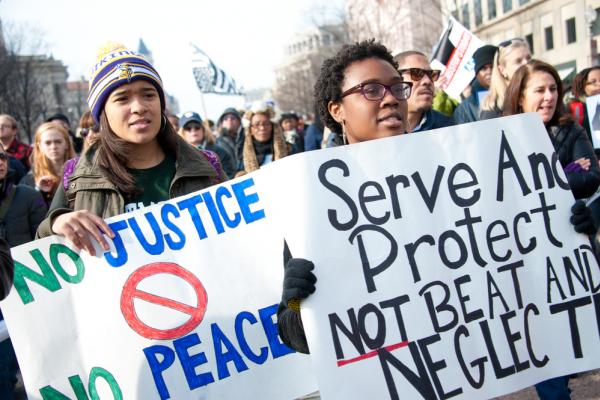Editor’s Note: We’ve had the privilege of connecting with many members of the broader Sojourners community (including some of you reading this!) during Sojourners President Jim Wallis’ America’s Original Sin book and town hall tour. Our conversations in cities like New York, Baltimore, Chicago, Atlanta, Los Angeles, and Portland are serving as a tool to engage people – particularly people of faith and white people — more robustly on issues of white privilege, race relations, criminal justice reform, and inequalities work. The conversations have been so rich and we wanted to capture a few reflections from those we see on the road to share with you all. The following reflection is from Ralph Cole, who we met at the Trinity Church Boston’s Price Lecture, and who shares more about what’s been happening with the dialogue around race at Boston since our tour stop back in early March.
An occasion worth marking happened in Boston earlier this spring: The city of Boston, Boston Alliance for Racial Equity, the Center for Social Inclusion, and the Government Alliance on Race and Equity (GARE) co-hosted a city-wide “Summit on Race and Equity: A Call To Government And Community” on May 16-17, 2016.
The Summit attendees spanned all sectors: city and state government workers, community activists, nonprofit advocacy groups, neighborhood organizers, and faith-based advocacy groups, including my own Trinity Boston Foundation as a sponsor. I also was invited to serve on the steering committee as a representative of the faith-based community. With over 500 attendees at the two-day sessions, and with over 80 people on the wait list, this Summit was testimony to the hunger for real tools to engage in up-stream racial justice and equity work.
The Summit mattered to me because across Boston — in communities, businesses, nonprofits, and the government — there is significant discussion about race and racial inequity. But across all indicators of success, including jobs, housing, education, criminal justice, and health, our city suffers from large racial inequities. This Summit was a convening that recognized the urgency to advance racial equity in our communities and institutions — an opportunity for greater impact by all sectors working together.
Trinity Boston Foundation (TBF) co-sponsored the event, as it aligned with the Foundation’s mission to unlock opportunity and change the odds for the youth of Boston. TBF’s work is born out of the strong social justice mission of Trinity Church Boston. TBF’s three youth-serving programs target social emotional wellness and learning to meet a spectrum of student needs, and stands out as it promotes three inter-related practices it believes are essential for the social and emotional health of all young people in Boston.
Through building community and sharing best practices with partner collaborative networks, TBF’s goal is that a multi-strand approach will become widely understood and adopted, including: trauma-informed practices, restorative justice practices, and racial awareness and identity development.
Planners of the Summit realized the work was not a two-day event, but a sustained organizing effort to achieve racial equity and transform government into an effective and inclusive democracy. As an integral part of this convening, Boston mayor Marty Walsh and his cabinet, in an hour-long session with Julie Nelson and GARE, formalized Boston as a member of the national GARE city network. Mayor Walsh committed Boston to the GARE data reporting requirements and use of GARE racial equity tools in three key departments: housing, economic development, and resilience.
There is change for racial justice and equity in the air in Boston, to an extent that I previously only hoped for but could not heretofore have envisioned. And as I look ahead to attending Sojourners’ upcoming leadership Summit, which focuses on the intersections and implications of race across numerous justice issues, I expect and pray for change to be in the air in D.C., and that the same winds may fill our sails in June.
Got something to say about what you're reading? We value your feedback!
